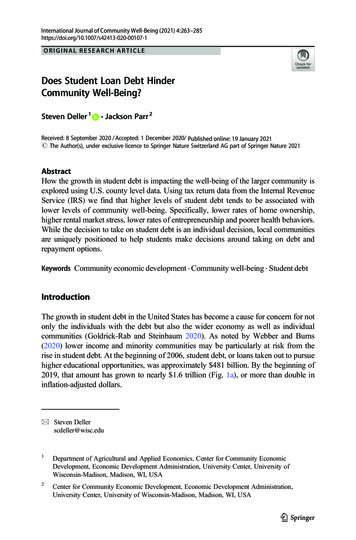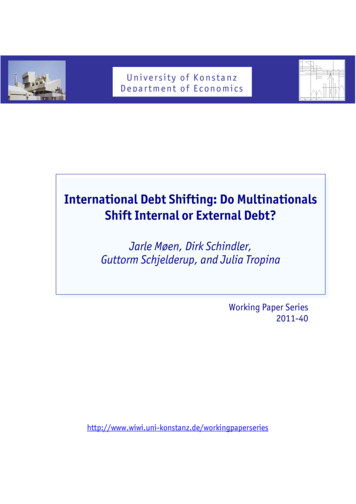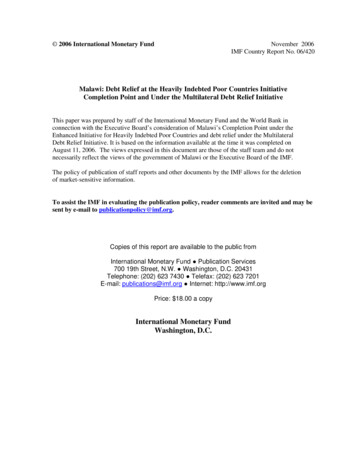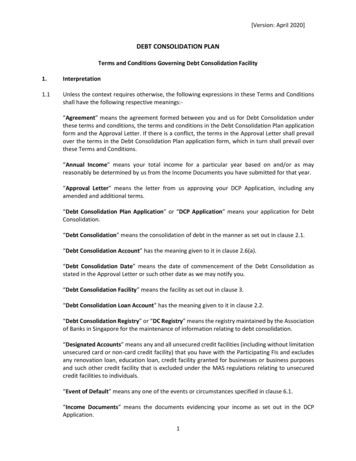
Transcription
Stopping the Debt SpiralMany families have to make impossible choices every day.Food or heat? Rent or car payment? Diapers or medicine?We decided to survey our neighbors and learn what poverty means for reallives, right now. Find out what we learned and how our Stepping Out of Poverty(STOP) Campaign is advancing policies that reduce poverty and the debt trap.POWER-PAC IllinoisSTOP Campaign Research and Recommendations Winter 2018A COFI PROJECT
AMPAIGNOVERTY CUT OF PEPPING OSTe to’s responsyilmafaSample ofeyarent surv-po-ttnerpa 12,000old members: 4Number of househ: 1,000Fines owed to city22,000Student loans: lls: 3,000Past-due utility biYearly householdincome:It doesn’tadd up.Low-incomefamilies—especiallythose headed bysingle mothers—don’thave enough moneycoming in just tomake ends meet.The result: Familiestrapped in the neverending spiral of debt.
The STOP CampaignMore than half of the familieswe surveyed live on less than 15,000 a year.Debt is getting us down andkeeping us down.We are real parents and we are workinghard every day just to get by. We decided todo our own research and to ask the experts—morefamilies like ours—to better understand the depths ofthe challenges around poverty. We surveyed over 300parents across Illinois to find out what would mosthelp families.What we discovered from our own and ourneighbors’ experiences is that debt is holding us back.Once the downward spiral of debt starts, it’s hardto stop.So we joined together to push for solutions.In 2009, we, as POWER-PAC, launched our SteppingOut of Poverty (STOP) Campaign after the “greatrecession” hit our families hard.We found champions and partners withadvocacy organizations including those in theIllinois Asset Building Group. With them, we hostedworkshops and community conversations on theRacial Wealth Gap and are working on asset buildingsolutions—like Children’s Savings Accounts.As mainly moms of color, we are hit hard by theunjust racial and gender wealth gaps. Please take alook at our stories, our recommendations for change,and the ground we’ve already gained!In our survey and organizing, we, as parents, are able to getthe real scoop. While at first people were hesitant to talk abouttheir debt, eventually they shared with us because we’re theirneighbors and friends.Anyonewho has everstruggledwith povertyknows howextremelyexpensive it isto be poor.JamesBaldwin,authorPOWER-PAC leadersbring real life experience.They shape the waywe think about policiesand legislation—and area powerful partner inwinning change.Lucy Mullany,Illinois Asset Building GroupOne of the mostexpensive things forlow-income families?Debt.1
Parent-to-Parent Surveyon Family FinancesWho are the 304 people we surveyed?Grassroots leaders expertise and commitment deeper knowledge,partnerships, and fresh strategiesto fight poverty37%79% Women53%AfricanAmerican/Black21%MenIn 2014, parent leaders in the Stepping Out ofPoverty Campaign hosted community forums,small group listening sessions, and conductedthe first membership survey on family financesto more deeply understand poverty issues. Debtemerged as a massive component in keepingfamilies trapped in a downward spiral.Gender67%31 to 6022%To dig even deeper, in 2016, campaign leadersdeveloped and conducted a more extensiveparent-to-parent survey, inspired and informedby partnerships and experience with anti-povertyadvocates. Parents worked closely with theChicago Foundation for Women, the HeartlandAlliance, the Illinois Asset Building Group (IABG)and others. Experts at Loyola University’s Centerfor Urban Research and Learning (CURL) helpedus develop the survey instruments and tabulatesurvey data.7% White3% OtherRace/Ethnicity50% Single11%over 6035% Married30 andunderAge58%ChicagoLatino/Hispanic10%Widowedor divorced5% OtherMarital Status18% East St. Louis, Illinois18% Chicago’s collar counties6% Chicago’s northern suburbsParent leaders conducted the surveys overthree months in 2016, talking with familiesacross Illinois.LocationRespondents’ Income Levels58% of respondentsOne mom said,Less than 15,000 annual income“Every month, it’s a crisisto pay the bills!”Sometimes when people hear “debt,” they assume we’remaking bad choices or living above our means. Morethan half the families in our communities live on lessthan 15,000 a year.Our families are in debt because we just don’thave the means to pay basic living expenses—rent, utilities, groceries and transportation.Add in medical bills, the high cost of fees for municipalviolations like parking tickets—parking tickets can runup to 100 each and red light tickets are 100 a pop inChicago—and debt is not a choice, it is a necessity. Oncewe’re in debt, it is so hard to get out!222%If you thinknobody caresif you’re alive,try missing acouple of carpayments.Earl Wilson,Major Leaguebaseball player 15,000– 30,00020%Over 30,00061.5% of respondents, or someone in their household,held paying jobs. 40% collect food stamps or WIC.47% of those employed (or with someone in theirhousehold who is employed) had no employmentbenefits, like health insurance or retirement.
SURVEY RESULTSDebt is a major, continual problem for low- and lower-income families.Types of Debt Reported by RespondentsThose with incomes under 15,000 annually reported higher rates of past due parking/traffic tickets and utility bills. Those withincomes above 15,000 reported higher rates of credit card, car loan, and mortgage debts. Student loan and health care debt wereproblems for respondents in all income groups.VIOLATIONStudentLoansPast-dueUtility BillsPast-dueHospital BillsOtherPast-due Payday 33%39%43%50%Income level less than 15,000Income level higher than 15,00054%3
SURVEY RESULTSIndebtedness feeds on itself, as latefees, family emergencies, and interestaccumulate: those with incomes under 15,000 particularly report being miredin debt, without plans or hopes ofgetting out from under it.Most Frequently Expressed Emotions Reportedby Respondents Regarding Their DebtFrustrated27%Experiences with Debt for Familieswith Annual Income Less than 15,000Overwhelmed 27%70%74%Sad 24%47%47%Bad 16%Angry 16%No planfor debtCannot stayahead of debt(never orsometimes)Preventionfrom movingaheadNegativeconsequencesfrom debtOnly 30% of those surveyed who reported incomeunder 15,000 were participating in any kind of planto try to repay their debts, while 65% of higher incomerespondents were participating in such plans.For many families, the consequences of debt are evenmore overwhelming than the debt itself. Indebtednessthwarts employment, education, finding decenthousing, business creation and other economicadvancement opportunities.Indebtedness endangers the healthof low-income families, emotionallyand physically. Respondents with thelowest incomes reported vastly more70%negative feelings.These emotions tended to go along with those who hadworse financial indicators (less savings, worse credit47.4% of47.2%score) and higher amountsdebt.People with unpaid bills (hospital, utility, traffic parkingtickets, other) tended to have worse feelings and lesspositive financial outlooks. Unpaid bills present familieswith additional financial burdens and many have to takeon additional debt in order to pay their bills, creating aspiraling cycle of debt.No planfor debtCannot stayahead of debt(never orsometimes)Preventionfrom movingaheadNegativeconsequencesfrom debtThe fees and fines add upso quickly. We do our bestto pay them off, but theseextra costs make me feel likeour financial future is veryunstable. It is so much stress.Cornelia Simms4
37%79% /BlackRESULTS7% White3% OtherRacial inequities and risingGenderRace/Ethnicityanti-immigrant sentiment impactfamily financesPeople of color and immigrants, especially those who10%are undocumented,67% are particularly vulnerable toWidowed50% Single31to6011%the debt trap. Disreputable lending services prey onor divorcedover60communities of color and manyfamilieslack access22%5% Otherto reliable financial productsand support.30 and35% MarriedImmigrant familiesunderlack access to public safetynet programs like LIHEAP (a federally-supportedutility assistance program) or are fearful of askingAgeMarital Statusfor help even when they and/or their children areeligible. Many predatory services target immigrantand undocumented families who might lack languageskills, identification, or credit history.Families alsoreport racial and ethnic profiling in58%the levying ofChicagotickets and fines by police, which, if18%moreEast St.Louis,Illinoisnot promptly paid, snowball intodebtwithpunishing additional fees. For example, survey18% Chicago’s collar countiesrespondents in Elgin, Illinois report that Latinos aresingled out for tickets for jaywalking.6% Chicago’s northern suburbsAcross the U.S., data shows that 50 billion inLocationcourt and justicesystem fees and fines are held by 10million people. Again, the most heavily hit are poorand people of color. Amazingly, local governmentsspend more to collect debt than the actual debt itself.(Asset Preservation Strategies: How Fines and Fees StripWealth from Low-Income Communities. Asset FundersNetwork)And, student loan debt also falls disproportionatelyon low-income African-American and Latinostudents—especially women. They are targeted bypredatory private loan companies and for-profitcolleges. Many end up with no transferable credits,of respondentsno degree, and a mountain of debt. More than twohavethirds of student loan debt is held by women, andNO57% of African-American women who are repayingSAVINGSstudent loans say that they aren’t able to pay forbasic necessities—like light bills. (Deeper in Debt:Women and Student Loans, 2017 report published byof verythe American Association of University Women)Parent-to-parent outreach helped families to openly sharetheir struggles as immigrants and families of color.Multiple Sources of DebtTwo-thirds of respondents have at least one currentdebt. Nearly 2 in 5 have three or more.2/347%low-incomerespondentssay debtprevents themfrom movingahead in life24%More than3 types of debt35%1 typeof debt15%3 typesof debt26%2 types of debt“Government-imposed fines and feesare part of a long history of policieswhich strip assets from low-incomepeople and erect barriers to them beingable to build assets over time.”POWER-PAC STOP Campaign leaders used skits to present onthe consequences of debt.Asset Preservation Strategies: How Finesand Fees Strip Wealth from Low-IncomeCommunities. Asset Funders Network5
SURVEY RESULTSNearly half of survey respondentssaid that debt prevents themfrom moving ahead in life, in veryspecific ways:Debt in the form of unpaid city fees likeparking tickets creates a barrier to beingemployed by the City of Chicago—as oneparent learned when she applied to be a schoolrecess monitor. People who have debt cannot getcity licenses for jobs like barber or beautician orcab driver. Thus, city policy—which lacks accessiblerepayment plans—limits access to employmentnecessary for families to catch up. And often, parkingticket debt leads to driver’s license suspension—no wayto get to the job if you find a job. Debt traps you in itsspiral again!Debts can accumulate in the course ofgaining employment, eroding earningpower significantly. For example, one motherfrom the Chicago Hermosa community said, “Myhusband is working at a shop, but he has to buy hisDecades Late, Governments Tryto Collect Debt Due to Their ErrorsThis Chicago Sun Times article from October30, 2017 tells the story of a 70-year-old womanliving on a fixed income who is being forcedto repay a 30-year-old debt of 741, an “overissuance” of her food stamp benefits because ofa government error.Eighty percent of recipients of SNAP and TANFare women and high percentages of people ofcolor are highly impacted by government debt.California just passed a law that wouldn’t allowthis debt collection to happen. After a shortperiod of time, over-issuances of SNAP and TANFbenefits are now considered county errors andnot-collectable debt.6The STOPSurvey foundthat:Our familiesstruggle withdebt burdensbecauseof lack ofresourcesto get outof the debtcycle andoftentimes,consequencesof havingdebt areworse thanthe debtitself.own materials and tools. We couldn’t afford to buythe tools outright so we had to get a credit card inorder to buy his materials. But he needed the tools todo his job, and the only credit card he could get hadextremely high interest rates.”For some, debt to the Public HousingAuthority is holding them back. In East St. Louis,families report being unable to move to new housingbecause of debt due to exorbitant fees and finesimposed by public housing. For many others, utilitydebt leads to shut-off of gas and electricity, leavingchildren and families literally in the cold. Parentsworry, what child can do homework while shivering in thedark?Well over two-thirds of survey respondentswith debt were behind on student loans.This precludes enrolling in higher learning and is aparticular problem for those scammed by for-profit‘educational’ or vocational programs that did not leadto gainful employment.
MEDICAL DEBT WEIGHS OUR FAMILIES DOWN STOP Campaign RecommendationsExpand Illinois’ Charity Care (health care providedfree or at low cost for low-income families) and ensurethat all patients at nonprofit hospitals and medicalcenters are told of their rights to assistance and how toaccess it.Parentsshare stories andsolutionsEnsure that access to the program is available inSpanish, family friendly, transparent and unimposing.Expand other free and low-cost options—inall Illinois communities—for the uninsured andundocumented.Nationally, maintain the Affordable Care Act andfund CHIP (the federal Children’s Health InsuranceProgram).Families become indebted, obviously, becausethey lack the income or savings to pay their bills,but also because of predatory systems that takeadvantage of low-income people. Our actioncampaigns are making a difference. Medical bills: Miriam’s storyOutside Chicago, the COFI groups Padres Con Poder in Elginand Padres Lideres Activos in Aurora found many familiesstruggling to access quality affordable health care in theircommunities, as many parents are undocumented and lackaccess to health insurance. As a consequence, many are jugglingdoctor and hospital bills, and often not getting needed medicalcare for fear of more debt.Miriam Hernandez’s 4-year-old daughter, Hailee,suddenly could not walk and was in a lot ofpain. Miriam and her husband immediatelytook her to the closest emergency room inElgin.“We arrived at the hospital at 10pm and theydidn’t take us until 1am. They had no sense ofurgency. At 2am the emergency doctor arrived.They did blood work, did an ultrasound andtook an x-ray. The doctor said to see thepediatrician that week and so we left.”The pediatrician prescribed medicine andmade a referral to an orthopedic specialist.“We could not get Hailee in for almost twoweeks and she still couldn’t walk.“I went to church to pray and the pastor saidhe knew a doctor in Chicago, 50 miles away.No way could we afford for my husband tomiss a day of work. We had to pay the rentfirst, so we waited a couple of days to go toChicago.“When we saw the Chicago doctor, he said, ‘Youneed to go to Lurie Children’s Hospital immediately.There is no reason a child should suddenly stopwalking like this.’No way couldwe afford formy husbandto miss a dayof work. Wehad to paythe rent first,so we waiteda couple ofdays to go toChicago [tosee a doctor].MiriamHernandez“At Lurie, they took us into care immediately and saidit was urgent. When I tried to do my best speaking inEnglish, they immediately found an interpreter. Theydidn’t do that in Elgin. No one spoke in Spanish withme at that hospital. The doctor at Lurie said to me,‘Your child has something very serious.’ Within tenminutes a surgeon arrived, and Hailee had an MRI. Thedoctors said that she has a spinal cord malformation andthat we came in just in time. He said that if we wouldhave come later and the malformation was bleeding, shewould never have been able to walk again.”With a lot of care, Hailee is now able to walk, butwith some difficulty. Miriam and her family continueto travel from Elgin to Chicago two to three timesper month for procedures and physical therapy. LurieChildren’s Hospital in Chicago found away to cover the cost of Hailee’s treatment.Miriam’s husband, though, loses a day ofwork for each trip to Chicago for Hailee’scare. On top of that, they have a 400 billfor the original ER visit in Elgin.Parents are taking action. Miriamis a leader in Padres Con Poder, and theorganization joined with Aurora parentsto launch a community campaign. Theyare meeting with the County HealthDepartment and local hospitals andproviders. Parents are pushing for increasedinformation and resources for families tohave access to free or low-cost medicalcare where they live. They want parentsto know their rights to access to CharityCare, a program that nonprofit hospitalsare required by law to offer. Parents inElgin and Aurora have found additional programs andshare information about financial assistance and low-feeservices for undocumented and uninsured families.7
PREDATORY UTILITY COMPANIES AND HIGH BILLS MAKE IT TOUGH TO KEEP THE HEAT ONUtility debt: Donna in the coldAcross the state, utility debt was identified as oneof the biggest hurdles for families.“The year my gas was turned off, I went for monthswithout a stove, no hot water, and no heat. At the time,there were five of us living in the house—me and myfour kids.“My brother helped me pay off the bill and also theextra late fees. But just when I think I got it whereit needs to be that gas bill shoots back up. The gascompany’s payment plan just doesn’t work on myincome. I make so little money that I can’t even affordthe payment they’re asking me to make. Now I’m backwith a balance of 800!“I live in the Englewood neighborhoodand there are a lot of scams out there.In the past I signed up with peoplewho knocked on my door to say Icould get better rates with them.They get your information and nextthing you know, your bill is flyingthrough the roof. One lady told me,‘you’re with this company’ but I don’teven remember signing up. One energycompany sent me a rebate coupon for 50 off whenI signed up for them. When I called to ask about therebate, the woman said she no longer worked with thecompany. It’s already hard enough out here and they’retrying to make it harder.”—Donna Carpenter, Englewood, ChicagoI am a motherof three,already livingpaycheck topaycheck. Isimply cannotafford to paymore for basicservices.AngelicaRosalesDonna and other parent leaders are takingaction in a statewide Utility Debt Campaign.In partnership with the Citizens Utility Board (CUB)parent leaders are hosting utility bill clinics. Familiesbring their bills and CUB representatives help themwork through the statements to see how they can savemoney and ensure that alternative suppliers are nottaking advantage with high cost plans. Parent leadersare also testifying before the Illinois CommerceCommission and taking action to advance policies andpractices to hold the utility companies accountable.In many low-income communities, predatoryalternative electric and gas suppliers knock ondoors and encourage residents to sign up with theircompanies. They sometimes offer discounts and rebates,but after only a few months the price skyrockets, evendoubling the utility company rates. STOP Campaign RecommendationsImplement Lifeline Rates for utility costs, rates that arebased on a family’s actual income, so that they’re chargedelectric and gas rates based on their ability to pay.Spread the word about available debt reduction,utility assistance and shut-off prevention programs for lowincome consumers.Regulate scam artists and predatory companies that runrampant in this market.Implement Community Solar in Illinois with low-incomefamilies at the table and ensure that the families that mostneed the cost savings get them!Parent leaders partnered with the Citizens Utility Board to host utility clinics to help families identify if they were being overcharged and help them take thesteps to reduce the cost of their utilities.8
FINES AND FEES KEEP US TRAPPEDHousing Authority fees and fines:Ms. DelbraParents United for Change is a COFI-supported parentorganizing group in East St. Louis. Many members live inpublic housing and have called out excessive fines and feesimposed by the Housing Authority. Those often-hidden costscan be devastating, resulting in layers of debt that trap parents.Parents are taking on a local campaign.“I’m a 52-year-old mom, and I’ve lived in the same placefor over 20 years. I am so proud to be working withother parents to put a stop to the crazy extra fees comingon top of the rent. We’re meeting with the HousingAuthority in East St. Louis to make changes, becausewith the extra fines and fees they throw on us we can’tget ahead.“You know what? On top of my rent I pay 8 extraa month to have a washer and dryer. Some of the unitshave central air conditioning but mine doesn’t, so I havetwo air conditioners and have to pay 9 extra for eachone. I have to pay a 25 fee for trash in the yard, even ifsomeone else put it there.“I don’t have a job outside the home, just no income.I have a friend who helps me out when I fall behind. Myrent is 177. But add to that 8 for a washer-dryer, 18 tomake it through our hot summers. That’s 26 extra, andit keeps getting higher. We get charged 50 for alate fee. That’s almost a third of what I payfor rent.“What are they doing with thatmoney? I waited for two years to get mybathroom floor fixed. It was so rottenthat I thought somebody might fallthrough!” —Delbra Myles, East St. LouisDelbra and other parent leadersare taking action by meeting and hopingto negotiate change with the Housing Authority andcity officials.Punitive hiring practices:Rosalva’s efforts to get a jobIf you have a debt to the City of Chicago, you are often deniedemployment in a city or school district job.In 1996, Rosalva began divorce proceedings to leave anabusive marriage. Her soon-to-be ex-husband slashedher tires and broke her car windows. He stole her licenseplates and racked up more than 6,000 of tickets andfines. When she tried to resolve the debts, the city toldher she was responsible: the tickets were in her name.There was nothing they could do because herex-husband had already been deported.Rosalva was stuck, but did all she could. “Every timeI tried to pay, the city insisted on a payment of at least20%. Once they demanded 2,000 down, which wasmore than I had coming in. Once they agreed to apayment of 1,500 down. I was working, but the jobWhen thesemothers andgrandmotherscame to me,I rememberthinking, ‘Well,you need toavoid gettingparking ticketsin the first place’but then theystarted sharingtheir stories.Hearing aboutwhat they’regoing throughreally mademe think aboutthis issue in adifferent way.Now, I’m reallydedicated toworking withthese womento make surethe City’s hiringsystem is fair!Toni Foulkes,Alderman,16th Ward, Cityof Chicago“I was offered jobs at my children’s school. But when they didthe application, they said ‘You have a bill with the city; you can’twork.’” —Rosalvawas seasonal, so when it was over I wasn’t able to keeppaying. I still had 3,000– 4,000 from his debt.”“I was offered jobs at my children’s school, to bea clerk and a recess monitor. But when they did theapplication, they said ‘You have a bill with the city; youcan’t work.’“This year, I finally made it my goal to pay it—andI did.“Asking individuals who are living on a fixed or lowincome to make payments greater than their monthlyearnings is unreasonable. That is how we becomeplagued with unpaid debts. Then, when opportunitiesarise to work with the city and earn critical extraincome, we are denied.” —Rosalva Nava, Co-Chair,STOP campaignRosalva and others are taking action andwinning changes in Chicago’s hiring practices to makeit easier for people with traffic and parking fees to getCity jobs. STOP Campaign RecommendationsImplement a financial justice scan to ensure that government fees and finesdo NOT have a disparate impact on low-income and people of color.Legislate governments, including the court systems, so that they cannotimpose unwieldy fees or debt collection procedures in order to fund theirbudgets on the backs of families least able to pay.Limit driver’s license suspensions to only actual traffic violations.Protect savings from debt collection (particularly college and retirementsavings accounts).Strengthen laws prohibiting the use of credit reports/scores in hiring.Nationally, fortify the federal Consumer Financial Protection Bureauand closely regulate all predatory lending (car title loans, payday lending, etc.).9
Advancing the STOP Campaign PlatformBeyondDebtWorking with our partners,we have achieved real change oneconomic security issuesfor families. POWER-PAC parent leaders launched our SteppingOut of Poverty campaign during the Great Recessionwhen families were hit particularly hard. Since then wehave found strong partners among advocacy groups andpolicymakers and advocates, like those in the IllinoisAsset Building Group (IABG), and with them, we havewon real change on economic security issues for families!POWER-PAC Co-Chair Rosazlia Grillier welcomes the thenGovernor and State’s Attorney General to COFI’s office to sign abill regulating payroll cards.Won payroll card reforms Many low-wageworkers weren’t getting a paycheck—they got a “payrollcard.” With the Illinois Asset Building Group, we tookaction and passed legislation requiring employers to getpermission before using a payroll card and assuring thatthe cards would not have hidden fees that nickel-anddime families with already low incomes.Eliminated TANF (Temporary Assistance forNeedy Families) asset limits Families that receivepublic assistance should not have to sell off the littleassets they might have built up. When a family needstemporary assistance to get back on their feet, it shouldbe provided, regardless of whether they have a smallsavings account or other asset. POWER-PAC helpedwin the elimination of asset limits so that families canreceive the support they need but still save for thefuture.We, as parent leaders, are taking our issues to the state legislature, working withpartners to win real change on family economic security policies.10
STOP CAMPAIGN VICTORIES AND INITIATIVESWe are organizing across communities throughout the state ofIllinois and are winning real changes.Increasing financial literacy and matchedsavings circlesFamilies need information to navigate complexfinancial issues—especially families with limitedresources. With partners, we have co-hosted financialliteracy workshops, summits on the racial wealthgap and Children’s Savings Accounts. Partneredwith the Citizen’s Utility Board, we hosted UtilityBill Clinics across Illinois. We also are supportinggroups of parents who are coming together to createsavings as a team. One group saved 250 each, whichwas matched by a local bank. Another group built apartnership with the local community foundation topilot a Children’s Savings Account program with asmall match.Parents are advocating for Children’s Savings Accounts. Wehelped win passage of the Illinois Student Loan Bill of Rights andthe restoration of Illinois Child Care Subsidies to previous levels.Increased access to child care subsidies andother important financial support policiesWorking with partners, we helped pass legislation onDomestic Workers Rights, to raise the minimum wagein Chicago, increase the state’s Earned Income TaxCredit and the restore Illinois child care subsidies to185% of the Federal Poverty Level.Won Illinois Student Loan Bill of RightsWe advocated for and spoke to the media about theIllinois Student Loan Bill of Rights which passed theIllinois Legislature in fall 2017 when they overrodethe veto of the Governor. The new law ends predatorypolicies of the student loan servicing industry, ensuringthat student borrowers and their families will receiveclear and transparent information about their loan andpayment options. It also creates a system of oversightand a Student Loan Ombudsmen as a resource forborrowers.Advocating for Children’s Savings AccountsWe pushed for Children’s Savings Accounts at the statelevel—winning support from the Illinois State Treasurerand working to pass a Children’s Savings Accountbill in the Illinois legislature. The Children’s SavingsAccount idea is that a 529 education savings accountwould be opened for each child in Illinois upon theirbirth, with a match for low-income families. Familiescould contribute to the account over the years andwhen the child turns 18 they could use the funds foreducational purposes.Fact:Women makeup 56% ofstudents inAmerica’scolleges anduniversitiesbut accountfor nearly twothirds of thestudent debt.We held community forums on the racial and gender wealthgap to understand how our personal stories fit into the biggerpicture.11
Thanks toour partners and fundersShout outResourcesWe are very grateful to the organizations and peoplethat have provided us with support, information andknowledge, resources, and partnership. Please knowthat the respect and the listening that really hears ourstories lifts our hope and courage.With your help, we win policy changes that benefitfamilies. Thank you!Other resources on poverty and asset-building worthchecking out:We thank the Center for UrbanResearch and Learning (CURL)at Loyola University of Chicagofor your partnership on theparticipatory research project andwe share a special thank you to theChicago Foundation for Womenfor supporting our organizing andleadership development work, forfunding our work with CURL, andfor underwritin
24% More than 3 types of debt 35% 1 type of debt 26% 2 types of debt 15% 3 types of debt 11% over 60 61.5% of respondents, or someone in their household, held paying jobs. 40% collect food stamps or WIC. . Payday Loans Mortgage 39% 43% 33% 22% 28% 30% COFI-STOP campaign-draft 4.indd 5 1/23/18 10:30 AM. SURVEY RESULTS










